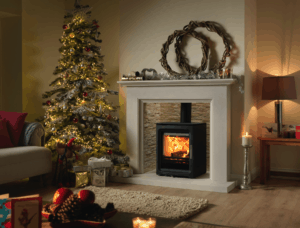Christmas Safety Tips
The cost of living and high heating costs as we approach Christmas 2023 is still biting – and will continue to do so well in to 2024. People are still very aware of the cost of heating. Despite these worries, it’s important to be aware of the dangers that tend to be more prevalent this time of the year, especially those related to heating.

With yet another festive period (almost) underway, it’s all too easy to forget safety considerations, which is especially true if you’re having friends and family over for celebrations. Here are a few quick and easy Christmas stove safety tips you should take a moment to consider.
Store Those Logs:
They may look great, and create a real festive winter look, but storing logs right next to the stove can be very dangerous. The reason for this is simple. Firewood, which is too close to a fire can sometimes ignite. Numerous house fires have been started this way. Make sure your firewood is kept at a safe distance from your stove, so they don’t get too hot.
Be CO Aware (Carbon Monoxide):
Be aware of the deadly threat that Carbon Monoxide poses.
Signs and clues:
* Flames should be crisp and blue, not yellow or orange
* Look out for soot or yellow-brown staining around or on appliances
* Your boiler pilot lights should not be inconsistent or frequently blow out
* Look out for more condensation than usual inside windows
Prevention:
* Fit a carbon monoxide detector
* Make sure your appliances, including stoves and fires are regularly serviced
* Burn the correct fuel
* Keep flues and chimneys clear
Guard Your Stove:
An unattended stove can be dangerous. If you have pets or small children around be particularly careful. There are a variety of stove guards on the market, which can protect against potentially serious burns.
Be Careful of Ash:
Hot or cooling ash can be a fire hazard, and also potentially a carbon monoxide threat. Always ensure that ash is cooled fully before removing it and that you use the correct safety gloves. When you remove the ash also make sure that it is disposed of in the correct way. Use an ash can or bucket to remove the ash, and take the time to ensure ash is carefully placed in the can or bucket – it’s easier than you think for ash to be blown in the air, especially if a door or window in a home is open. You can also recycle your ash.
Watch What You Burn:
Keeping warm is currently very expensive. But don’t use that as an excuse to burn rubbish. Never burn wrapping paper – as tempting as it may be. Not only could you risk destroying a small gift hidden deep inside the bundle of paper, wrapper paper often contains plastic and other elements, which are not suitable for burning on a stove. Here is a link to an article we produced about burning rubbish and why it’s so bad.
Check Smoke Alarms:
Often installed, easily forgotten! A smoke alarm with no power is as useful as no smoke alarm. Take a moment to check them and if you can’t remember the last time you replaced the batteries, then replace them. If your fire alarm is mains operated, make sure your backup battery is working.
The Burning of Other Wood:
Only wood on your stove (or other designated fire) should burn at Christmas. However, sadly there are always reports of Christmas trees catching fire. This can happen if tree lights are faulty, are frayed or the plug sockets are overloaded. You should only buy tree lights marked with the British Safety Standard sign.
Keeping your tree well watered can help reduce the chances of a fire too, as the wood in the tree will have a higher water content – making it less likely to burn, compared to a dried-out tree. The main thing here is to reduce sources of ignition, which are almost always from Christmas tree lights, which go wrong.
Tips to Burn Better:
1. Use seasoned wood only, ideally with a moisture content of no more than 20%.
2. Top Down Method – Put kindling on top of the larger logs when starting a fire. It’s more efficient and causes less pollution.
3. Keep a fire hot – keeping a fire hot and not “running down” what you have is a good idea. When a fire is hot, it’s efficient. Letting it use up the firewood before adding more will ultimately use more fuel, so try to avoid this.
If you fancy trying cooking by wood this festive period and you own a Go Eco BakeChef why not try a few of our festive recipes? View our Twelve Days of Christmas.
Being safe at Christmas doesn’t have to be hard work – it just takes a few moments to think.








